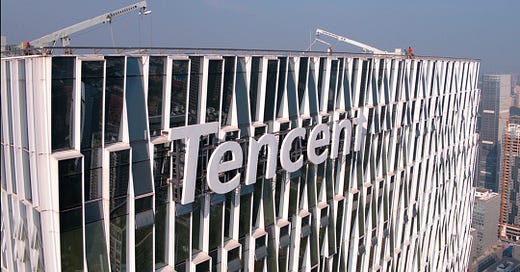Free to Read: Tencent Restructures AI Unit
The tech giant launches new departments to accelerate integration of AI models into its apps including the Chinese version of its ubiquitous messaging platform WeChat
The increased bet aligns with similar AI investments by rivals such as Alibaba Group Holding Ltd. Photo: Tencent
Tencent Holdings Ltd. has set up two new departments to accelerate the development of its generative artificial intelligence (AI) as the Chinese tech giant is trying to roll out AI capabilities across its portfolio of apps.
One department is dedicated to developing large language models (LLMs) while the other will focus on multimodal models, the Shenzhen-based company announced Tuesday.
LLMs are AI systems capable of understanding and generating language by processing text data. Multimodal models can process and understand information from images, text and videos.
The latest adjustments will help consolidate resources, streamline research and development processes, and strengthen the company’s long-term technical capabilities in AI, Tencent said in a statement to Caixin.
This marks the second organizational restructuring this year involving Tencent’s large model teams. The expansion is part of Tencent’s broader strategy to incorporate AI models into its popular consumer-facing apps including Weixin, the Chinese version of its instant messaging app WeChat, and improve its AI chatbot Yuanbao.
In February, Tencent beta tested Weixin’s search function powered by DeepSeek’s R1 model. Also that month, the company announced plans to integrate its first self-developed reasoning model Hunyuan T1 into Yuanbao.
Tencent President Martin Lau is bullish about the applications for AI. On a post-earnings call in March, he said that more Tencent apps, including instant messaging platform QQ and QQ Browser, would also be equipped with AI-powered features, adding that this synergy would help expand their user base.
Lau also said that AI will be a key focus of Tencent’s strategic investments. The company’s AI-related spending jumped to 39 billion yuan ($5.4 billion) in the fourth quarter of 2024 after buying large quantities of graphics processing units to support its cloud, gaming and advertising businesses.
The increased bet aligns with similar AI investments by rivals such as Alibaba Group Holding Ltd., which said in February it would invest at least 380 billion yuan into cloud computing and AI infrastructure over the next three years.
Alibaba on Tuesday released a new open-source LLM, the Qwen3, which it claims performs better than DeepSeek-R1 and is cheaper to deploy.




